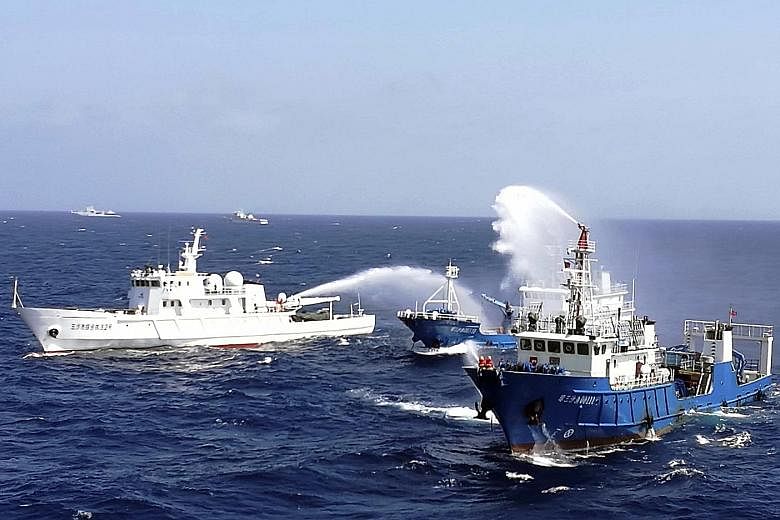BEIJING • Concerns about relations between Singapore and China have flared again, after the Global Times claimed that Singapore had pushed to include an international tribunal's ruling on the South China Sea in the final document of the recent Non-Aligned Movement (NAM) summit.
In a report in its Chinese edition on Sept 21, the newspaper cited sources as saying that Singapore had insisted on adding contents endorsing a Hague-based arbitral tribunal decision on July 12 which dismissed China's territorial claims in the vital waterway.
Singapore's Ambassador to China Stanley Loh, in a letter dated Sept 26 to the tabloid newspaper's editor-in-chief Hu Xijin, said Singapore did not raise the South China Sea issue or the tribunal ruling at the summit in Venezuela.
Still, the Global Times report prompted some Chinese commentators and netizens to publicly call for tough measures to "punish" Singapore. Some Singaporeans, especially those based in China, have also wondered why Singapore, which is not a claimant in the territorial row, is risking Chinese ire by allegedly pushing the South China Sea issue.
To understand the motivation behind and significance of the Global Times' attacks on Singapore, a correct perspective of the newspaper, its modus operandi and its standing in China is critical.
The Global Times is officially a party-linked media outlet run by the People's Daily, the official mouthpiece of the Chinese Communist Party. This means it is supposed to toe the official line and reflect the government's stance on key issues.
But being a commercial newspaper means that it adopts a looser editorial policy to attract readers and advertisers.
The problem is that in trying to set itself apart from other similar publications, the Global Times has honed a market niche - and gained a notorious reputation - for its nationalistic, sensational and aggressive coverage of China's foreign relations.
The most controversial section of the newspaper is its opinion pages, which publish editorials written by its editor-in-chief or ghostwritten at times on his instructions.
It thrives - attracting eyeballs with language that often borders on being crude and offensive - by criticising foreign countries seen as China's strategic rivals or as acting against its national interests.
Its Chinese and English editions attract different readerships. The former, launched in 1993, now has a daily circulation of two million; the latter came out in 2009 and now has a daily circulation of 200,000.
Those who read the Chinese edition are mostly college-educated, white-collar males who like the paper's nationalistic tone.
Foreign diplomats, journalists and scholars tend to read the English edition to get an idea of what Chinese officials may be thinking or planning to do, but which they are unwilling to articulate publicly.
Some believe the Global Times has at times been used as a proxy for the government or officials in sending signals - mostly warnings - to other countries.
But its style is controversial even in China, with a media studies professor likening it to a rabid lapdog for the state. Many Chinese scholars and diplomats frown on the paper and criticise it for not understanding how diplomacy works. The government has also taken it to task before over its reportage.
Given such mixed feelings about the newspaper, it is difficult to tell when the Global Times is acting on its own and when it is reflecting the official stance. Similarly, it is hard to tell the extent of state involvement in or backing for its Sept 21 report criticising Singapore.
Last week, a Chinese Foreign Ministry spokesman commenting on the spat accused "some individual countries" of insisting on playing up the South China Sea issue in the final document.
But beyond that, the saga has largely been ignored by state media such as the Xinhua news agency and China Central Television.
Still, one should not dismiss the Global Times report or view it in isolation. The report is but the latest in a series of attacks directed at Singapore.
In June this year, the Global Times published a commentary by Chinese Academy of Social Sciences researcher Cheng Bifan, who said Singapore was taking sides against China on issues such as the South China Sea. It prompted a rebuttal by Mr Loh.
In August 2013, Singapore's Ministry of Foreign Affairs rebutted a Global Times report that it said "grossly distorted and misreported" remarks that Prime Minister Lee Hsien Loong made at a forum in Tokyo about China's territorial disputes and relations with its neighbours.
Each report has been followed by a discernible increase in the volume and intensity of vitriol in the Chinese media and cyberspace, particularly over Singapore's close ties with the United States and support of American military deployment in the region.
There are several possible reasons for this. First, the Global Times could be trying to attract readers, knowing that publishing critical reports appeals to nationalistic sentiments and will elicit a response from Singapore.
Second, its reportage could be part of a long game by some quarters in China to diminish Singapore's international standing and, in turn, discredit its implied support of the tribunal ruling through calls for international law to be respected.
Third, perhaps most worryingly, it may be an attempt by some quarters to put pressure on nations to choose sides between China and its strategic rivals such as the US.
Many Chinese have high expectations that Singapore, being a Chinese-majority society, should side with China. Some also strongly believe that Singapore should repay the economic benefits gained from China's rise in the past few decades, often forgetting how Singapore has contributed to China's development through bilateral cooperation projects and supported Chinese initiatives such as the Asian Infrastructure Investment Bank. Bilateral trade and investments have also benefited both sides.
Even as the dust settles over the latest saga, experience has shown it is unlikely to be the last, unless steps are taken to improve the situation.
Both sides should note that diplomacy is better conducted behind closed doors and not through the megaphone of the media, which could only aggravate relations.
Singapore has to be mindful of being fair and principled in dealing with all big powers. Feedback from Chinese officials suggests that while they understand Singapore's independent foreign policy, they are nevertheless growing increasingly doubtful about its neutrality.
Cooler heads also need to prevail at the people-to-people level.
Chinese defence adviser Jin Yinan's call for sanctions against Singapore is counter-productive.
Hostility would only increase a country's business risk and scare away foreign investors. The Chinese market holds appeal for Singapore companies, but a slowing Chinese economy also needs foreign investments.
Thankfully, the call by Professor Jin, a major-general and former director of the strategic research institute at the National Defence University, has not gained much traction in China. Also, under Chinese President Xi Jinping, Singapore-Sino bilateral cooperation has deepened. A new government-led project was launched in Chongqing and new areas of collaboration are being explored.
Many Singaporeans may want or hope that their Government would take a more low-key approach towards the South China Sea issue since Singapore is a non-claimant.
But they need to understand that doing so could put Singapore's own interests - respect for international law, freedom of navigation and a united Asean - at risk and potentially cause more harm over the long term.
The NAM saga, be it a case of misreporting or misunderstanding, has already done some damage. It has led to a growing unease about China's rise and assertiveness.
The Singapore-China relationship, which is steeped in mutual trust among top leaders and is a multifaceted one, is bigger than the South China Sea issue. Even so, it is prudent to prevent a vicious circle of mistrust and suspicion from forming.



